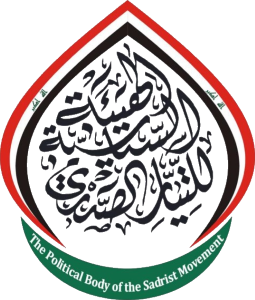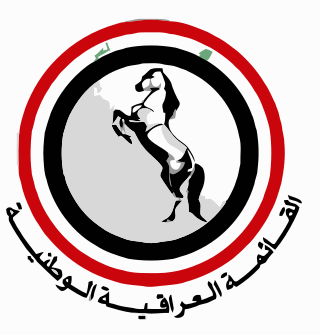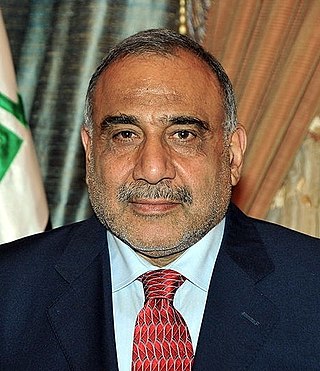In the aftermath of the 2010 election, great attention was given to the decision on who should be the next Iraqi PM. Both al-Iraqiyya's Allawi and the State of Law coalition's al-Maliki laid claim to the post, so it was seen as up to the Kurdish parties and the Iraqi National Alliance to decide this matter.
One of the two main components of the INA, the Supreme Iraqi Islamic Council, stated it would not join any government that did not include former PM Allawi; the other main component, the Sadrist Movement, held an unofficial referendum on 2 and 3 April 2010 on who should be PM. The possible choices were Allawi, al-Maliki, former PM Ibrahim al-Jaafari, Adel Abdel Mahdi from the SIIC, and Jaafar al-Sadr (a little-known MP from al-Maliki's Dawa Party, son of its ideological founder Mohammad Baqir al-Sadr). [1] On 7 April 2010, results were announced, according to which al-Jaafari had won with 24% of the vote. [2] Jaafari had originally been a member of al-Maliki's Dawa Party, but had left it in 2008 to found his own party, the National Reform Trend, as whose lone MP he was elected in this election.
The full results of the 1.43 million ballots cast in the unofficial Sadrist referendum were as follows: [3] [4]
Background
After months of negotiations the National Iraqi Alliance and the State of Law Coalition agreed to merging into one parliamentary bloc of 159 seats, the bloc would be 4 seats short of a majority but would have the right for government formation. [5] However the bloc has to date still not appointed a prime ministerial candidate. [6] The bloc, called the National Alliance, was formally formed on 11 June 2010. The new parliament opened on 14 June 2010. [7] However, talks between the National Iraqi Alliance and al-Iraqiyya continued. [8] On 3 September 2010 the National Iraqi Alliance nominated Adil Abdul-Mahdi as the coalition's nominee for Prime Minister, making it unclear which candidate the National Alliance bloc would ultimately choose. [9]
The President of Iraqi Kurdistan Massoud Barzani announced the four major Kurdish lists: the Kurdistani List, the Gorran List, the Kurdistan Islamic Union and the Islamic Group of Kurdistan agreed to merging into one parliamentary bloc of 57 seats, called the Coalition of Kurdistan Lists or Kurdistan Blocs Coalition (KBC). [10] On 30 October, however the Nawshirwan Mustafa's Gorran Movement (announced their withdrawal from the KBC due to a dispute between Gorran and the ruling KDP-PUK coalition in the Kurdistan Autonomous Republic. This reduced the bloc to 49 seats [11] In August the KBC announced 19 demands which would have to be agreed upon by al-Maliki or Allawi for them to join their government. [12] The Islamic Supreme Council of Iraq then agreed to all 19 demands. [13] Incumbent Prime Minister Nouri al-Maliki agreed to 18 out of 19 demands (including implementation of article 140), only disagreeing with the demand that the government were to resign if the Kurdistan Alliance withdraws. [14] Al-Iraqiya, however, rejected 9 of the Kurdish demands, including the demands for a Kurdish presidency, Iraqi government funding of the Peshmerga and for the implementation of article 140 of the Iraqi constitution. [15]
Incumbent Prime Minister Nuri al-Maliki also visited Iran amid drawn out coalition talks. [16] The trip came amid reports from the Los Angeles Times and the Guardian that Iran had been directly involved trying to bring about a Shia coalition by convincing Muqtada al-Sadr to back an al-Maliki-led government, and thus increase Iran's influence in Iraq against those supported by the West. Iyad Allawi's bloc, which won a plurality, would then be sidelined. As such Allawi claimed to CNN that Iran was "trying to wreak havoc on the region, [by] trying to destabilise the region by destabilising Iraq, and destabilising Lebanon and destabilising the Palestinian issue. This is where unfortunately Iraq and the rest of the greater Mideast is falling victim to these terrorists who are definitely Iran-financed and supported by various governments in the region." His deputy was also alleged to have said "Iranian involvement amounts to a takeover of Iraq." [17] While the West expressed worry about Iran's growing influence and potential influence in Iraq, Iran's Supreme Leader Ayatollah Ali Khamenei said, in responding to al-Maliki description that mutual relations were strategic and amicable, "Despite relative stability in Iraq, the country is still suffering from insecurity and part of this insecurity is resulted from the pressures that are exerted by some powers whose political interests lie in creating insecurity in Iraq." [18] Following his visit to Iran, al-Maliki also visited Syria, Jordan and Egypt, where he said a new government could be imminent as "discussions are taking place, we are now at the end of the tunnel, at the end of the road. If God allows, this government will emerge soon." [19] A few days later, Iranian President Mahmoud Ahmadinejad talked to his Iraqi counterpart Jalal Talabani and said he "hope[s] that with the formation of a new Iraqi government, bilateral ties will expand in different areas, especially in the economic and political fields." [20]
Saudi Arabia also offered to host an all-party conference in November to break the deadlock in government formation. However, al-Maliki's bloc turned down the proposal amid concerns over foreign interference. [21] The National Alliance issued a statement saying: "Though we express our appreciation to Saudi Arabia for its concern about the situation in Iraq and its willingness to provide support, we would like to confirm Iraqi leaders are continuing their meetings to reach a national consensus." a statement issued by the alliance, said. The Kurdish Alliance also reportedly supported the statement. While Iraqiya welcomed the Saudi initiative. "We ask all political blocs to welcome the initiative, preventing Iraq's security situation from deteriorating." [22] The United States also called for an "inclusive government." It said that Allawi and others from Iraqiya, as well as all the "winning blocs" should hold "leadership posts" in a new government. [23] In early October, the National Alliance (consisting of State of Law and the NIA) nominated Nouri al-Maliki as their Prime Minister candidate after Muqtada al-Sadr and al-Maliki struck a deal together. [24] [25] This however led to a split within the National Alliance (159 seats) as the ISCI-bloc (which including Badr and Hezbollah holds 19 seats), the Islamic Fadhila Party (6 seats) and the Gathering of Justice and Unity (1 seat) [26] left the alliance to create an alliance with Ayad Allawi's al-Iraqiyya (91 seats). [27] The Iraqiyya led bloc nominated prominent ISCI politician and at the time Vice-President Adil Abd al-Mahdi as Prime Minister. [28] Meanwhile, the two minor Sunni blocs, Unity Alliance of Iraq and the Iraqi Accord Front merged into one 10-seat bloc, called the Center Current, which entered into negotiations with both major blocs for coalition partnerships. [29] However, both blocs needed the support of Kurdish parties to gain a parliamentary majority, this support was eventually given to al-Maliki's bloc after he agreed to all 19 Kurdish demands, which led to the re-uniting of the National Alliance. [30]
On 24 October, the Supreme Court of Iraq ordered the parliament to reconvene and elect a new speaker. [31] [32] [33] The court ordered a parliamentary speaker to be chosen on 8 November [34] The day before the vote for parliamentary speaker, a power-sharing accord was agreed to that would allow al-Maliki to continues as PM. As talks to form a new government reached a climax al-Maliki and Allawi were scheduled to attend a ceremony in Arbil, the capital of the autonomous region of Kurdistan, to make a formal announcement in regards to the agreement. Iraqiya MP Jamal al-Butikh then said an agreement was reached after assurances that "no political decision would be made without its agreement." [35] At one point, Iraqiya staged a walkout after al-Nujaifi declined a request to vote on the removal of three parliament members' names because of affiliation to the deposed Saddam Hussein's Ba'ath Party. [36] They later said the walkout was a misunderstanding. [37]
During the parliamentary session on 11 November, Osama al-Nujaifi, a Sunni Arab from Iraqiya's al-Hadba Party was elected to be parliamentary speaker, with prominent Sadrist leader Qusay al-Suhail chosen as his first deputy and Arif Tayfur (a leading member of Massoud Barzani's Kurdistan Democratic Party [38] ) was re-elected to the post of second deputy speaker. [39] Patriotic Union of Kurdistan leader Jalal Talabani was re-elected as President, al-Maliki was re-elected as prime minister and Allawi had reportedly agreed to head a new security council. [36] Massoud Barzani, the president of Kurdistan region said that it was a great victory for the Iraqi people, which came at a late stage. [40] A third session of the new parliament on 21 November still did not come to an agreement on who would run the new government. [41]















